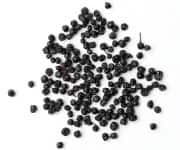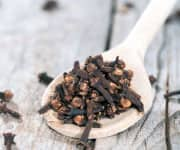Life Extension Magazine®
For some people, the holiday season is notorious for overeating and consuming the wrong kinds of foods. This is when people put on a few extra pounds they never seem to shed.1-4
These extra few pounds build up year after year. After a few holidays, suddenly your clothes don't fit, and the pounds don't come off.
This weight gain is not just unattractive—it's harmful. Over time, excess weight becomes its own organ, spewing out inflammatory compounds that inflict systemic damage. The list is long of the diseases that can result from just a few extra pounds.
While dieting is difficult and good intentions often fail, recent research has found that less restrictive dietary programs, such as intermittent calorie restriction, may be as effective as calorie counting, providing the same degree of weight loss along with other health benefits, but in a program that is easier to stick to.
Scientists at Life Extension® have developed and studied an intermittent calorie restriction nutrition program that aims to help avoid holiday weight gain. The program utilizes intermittent calorie restriction, with the added benefit of supportive nutrients to help make adherence easier and maximize beneficial outcomes.
The goal of this study was to prevent weight gain during the holiday season where unhealthy overeating is the norm.
The results of this study showed that participants on the intermittent calorie restriction program did not gain weight and experienced a modest amount of weight loss. In addition, this nutrition program demonstrated other benefits, including improved lipids.5
What you need to know
- Studies show that the winter holiday is a significant contributor to cumulative weight gain.
- Cumulative weight gain and obesity are associated with increased risk for many diseases and overall mortality.
- While calorie-counting diets are often difficult to follow and fail frequently, intermittent caloric restriction programs can lead to an equivalent degree of weight loss and other health benefits but with a better success rate.
- Scientists at Life Extension have developed a nutrition program that utilizes the increasingly popular 5:2 intermittent caloric restriction approach, only limiting food intake on two days out of each week.
- By providing dietary support through nutritionally balanced shakes, as well as supplements aimed to reduce food cravings and jump-start the metabolism, this program aims to improve upon the benefits associated with an intermittent calorie restriction approach to weight management.
The Advantages of Intermittent Caloric Restriction

Traditional weight loss diets limit the number of calories an individual can eat each day. When adhered to, these diets can result in weight loss and improved health. However, this requires counting calories for everything one ingests, every day.
These restrictive diets often fail because compliance is poor.6,7 Typical low-calorie "diets" drastically change the types and amounts of food an individual is accustomed to eating. As a result, overweight people often give up their good intentions and return to their previous dietary habits.
Studies published in 2018 uncover an approach that only restricts dietary intake part of the time. Findings from these studies show they can be as effective as continuous caloric restriction for weight loss, while being easier to adhere to.8,9 Rather than restricting food intake all day and every day, these intermittent calorie restriction programs only restrict food intake on some days, allowing individuals to eat as they usually do on the other days of the week.
There are several versions of intermittent calorie restriction diets. Variants of what's known as the "5:2 diet" have become increasingly popular with people seeking safe and easy weight loss along with some of the benefits of calorie restriction. A growing body of medical literature supports the efficacy of these diets.9-11
These 5:2 programs restrict caloric intake on just two days of the week, allowing one to eat normally (both in types of food and in quantity) on the other five days. Most people find this simplified calorie restriction easy to follow.
Weight Loss & Other Health Benefits of Intermittent Caloric Restriction
Clinical studies have proven that various forms of intermittent caloric restriction not only result in weight loss, but also yield other positive health effects.12-15
The amount of weight loss observed in 5:2 programs is comparable to that seen in those who follow a traditional full-time caloric restriction diet.9-11
For example, a group of randomized obese subjects were put on a 5:2 intermittent diet or a continuous caloric restriction for six months.11 Both groups lost significant weight compared to their baseline, with a similar degree of weight loss in each group. Those on the intermittent calorie restriction diet lost an average of 14 pounds.
Intermittent Calorie Restriction Nutrition Program

Having observed this trend in the medical literature, scientists at Life Extension set out to improve upon existing calorie restriction programs, particularly to help people avoid the insidious holiday season weight gain that plagues so many people.
The intermittent calorie restriction program utilizes the calorie restriction approach of two consecutive days of limited calories (730 calories/day) and five days of normal eating. In addition, it aims to improve upon that basic concept in two ways:
Provide a healthy balance of protein, fats, and carbs in tasty protein shakes to make the work of calorie counting on the two calorie-restricted days per week easier, improving adherence.
Provide a specific blend of nutrients that help maintain adequate nutrition, reduce cravings, and increase metabolism.
In a pilot study conducted at the Life Extension Clinical Research Center, the goal was to see if this 5:2 program could limit weight gain during the holiday season. This particular study was not designed as a weight loss study. Overweight adults were randomized to a nutrition program with nutrient shakes and supplements for two consecutive days, followed by five days of regular eating. The control group ate in their usual way, with the addition of a daily multivitamin for a period of 52 days over the winter holidays.5
On average, individuals in the control group who ate their regular way did not lose meaningful weight, while those in the nutrition program lost a modest amount (average 2.9 pounds) of weight. If extended for six months, as was done in the 2018 published study,9 greater weight loss would possibly occur. However, the focus of this study was to limit holiday weight gain which was successfully achieved.
In addition, subjects on the nutrition program saw increases in beneficial HDL cholesterol levels and reduced levels of triglycerides. These changes indicate a reduction in cardiovascular and metabolic risk. (It is challenging to boost beneficial HDL as people age.)
People in the control group who continued on their normal diet and did not have the advantage of the nutrition program saw their risk factors change for the worse. Their total cholesterol, LDL cholesterol, and fasting insulin all increased significantly.5
Supporting Caloric Restriction: Nutrients to Help Maximize Benefits

The nutrition program was designed to build upon the benefits that have already been demonstrated with other intermittent calorie restriction diets. In particular, an assortment of nutrients and supplements have been carefully selected to support the weight-management program.
Any nutritional program that limits calories should be carefully designed to ensure an adequate intake of key essential nutrients, including minerals, vitamins, and metabolic supporting blocks. A daily multivitamin can help provide many basic minerals and essential vitamins.
Omega-3 fatty acids are also an important component of a healthy diet and support healthy cardiovascular and nervous system function.16-21 Cardioprotective effects of omega-3 fatty acids include reduction of triglycerides and prevention of cardiovascular disease. In addition, some studies have suggested that these fats may have direct anti-obesity effects.21-24
Coenzyme Q10 is an important cofactor for a healthy metabolism. It helps to optimize cellular utilization of nutrients and energy supply.25,26
Another approach to help stimulate the metabolism and optimize our nutritional program is to activate AMPK, an important regulator of cellular metabolism. Gynostemma pentaphyllum is an herb that has been found to have many beneficial properties, including AMPK stimulation and anti-obesity effects.27-30
Extracts of clove bud and maqui berry have further metabolic supportive functions. They have both been found to help support healthy glucose metabolism and maintain normal levels of blood sugar following meals.31-35
Another important factor to consider for any nutritional program that limits calories, even intermittently, is the risk for food cravings and snacking that can sabotage the diet.
Even though calorie intake is only limited on two days out of the week in the nutrition program, any period of calorie restriction can potentially cause unhealthy food cravings. Cravings are a notorious problem for people following diets that restrict food and calories, and irresistible urges to snack have sabotaged many weight loss plans. Supplements that have been found to provide appetite suppressant effects can be useful in this context.
Extracts of the herb saffron and some types of beans have been found to be helpful in controlling cravings as they can contribute to satiety, or the feeling of fullness after a meal, thus reducing cravings and the chance of snacking.36-38
Calorie restricted diets have been shown to have healthy effects on the beneficial microorganisms that reside in the digestive tract.39 Intake of a prebiotic supplement can help support gastrointestinal health and promote the growth of healthy bacteria in the gut.40,41
Finally, curcumin, a compound found in turmeric root, is a potent anti-inflammatory that helps boost the body's defenses. Curcumin has been found to have many health benefits, including support for weight loss.42-44
The Many Health Benefits of Calorie Restriction and Intermittent Fasting
 |
In addition to aiding in weight loss, which reduces risk for chronic disease, evidence supports several other health benefits influencing many different body systems and the risk for age-related and chronic disease. Some of the notable effects that have been reported include:
- Improvement in memory in elderly subjects45
- Reduced risk for cancer and improved efficacy of cancer treatment46
- Improvement in blood lipid profiles, including decreased triglycerides and LDL cholesterol levels and increased HDL cholesterol9,11,14,47
- Improved blood sugar control with improved levels of insulin and glucose, including among those with type II diabetes15,48
- In addition to weight loss and improved blood lipid and glucose control, caloric restriction appears to offer several other benefits to overall heart and metabolic health, reducing the risk of atherosclerosis and heart disease12,47,49
- Improvement in normal gut flora, an important marker of health39
Summary

For many people, the winter holiday season is a time to enjoy good food with good company. Unfortunately, it is also often associated with significant weight gain, which can contribute to the development of obesity and risk for many chronic diseases.
Restriction of calorie intake is associated with many health benefits beyond weight loss alone. However, continuous calorie restricted diet programs are often burdensome and difficult to stick with, resulting in failure and rebound weight gain.
Intermittent calorie restriction, where dietary intake is only restricted on some days of the week, has been shown to provide the same level of benefit, leading to weight loss as well as reduction of other risk factors associated with chronic disease.
A newly designed nutrition program aims to optimize this intermittent calorie restriction approach, providing additional dietary and nutrient support to improve adherence and prevent weight gain during the winter holiday season.
If you have any questions on the scientific content of this article, please call a Life Extension® Wellness Specialist at 1-866-864-3027.
References
- Helander EE, Wansink B, Chieh A. Weight Gain over the Holidays in Three Countries. N Engl J Med. 2016 Sep 22;375(12):1200-2.
- Hull HR, Radley D, Dinger MK, et al. The effect of the Thanksgiving holiday on weight gain. Nutr J. 2006 Nov 21;5:29.
- Stevenson JL, Krishnan S, Stoner MA, et al. Effects of exercise during the holiday season on changes in body weight, body composition and blood pressure. Eur J Clin Nutr. 2013 Sep;67(9):944-9.
- Yanovski JA, Yanovski SZ, Sovik KN, et al. A prospective study of holiday weight gain. N Engl J Med. 2000 Mar 23;342(12):861-7.
- Hirsh S, Pons M, Joyal SV, et al. Intermittent calorie reduction to prevent winter holiday weight gain. In Press. 2018.
- Mann T, Tomiyama AJ, Westling E, et al. Medicare's search for effective obesity treatments: diets are not the answer. Am Psychol. 2007 Apr;62(3):220-33.
- Sumithran P, Prendergast LA, Delbridge E, et al. Long-term persistence of hormonal adaptations to weight loss. N Engl J Med. 2011 Oct 27;365(17):1597-604.
- Antoni R, Johnston KL, Collins AL, et al. Intermittent v. continuous energy restriction: differential effects on postprandial glucose and lipid metabolism following matched weight loss in overweight/obese participants. Br J Nutr. 2018 Mar;119(5):507-16.
- Sundfor TM, Svendsen M, Tonstad S. Effect of intermittent versus continuous energy restriction on weight loss, maintenance and cardiometabolic risk: A randomized 1-year trial. Nutr Metab Cardiovasc Dis. 2018 Jul;28(7):698-706.
- Conley M, Le Fevre L, Haywood C, et al. Is two days of intermittent energy restriction per week a feasible weight loss approach in obese males? A randomised pilot study. Nutr Diet. 2018 Feb;75(1):65-72.
- Harvie MN, Pegington M, Mattson MP, et al. The effects of intermittent or continuous energy restriction on weight loss and metabolic disease risk markers: a randomized trial in young overweight women. Int J Obes (Lond). 2011 May;35(5):714-27.
- Bales CW, Kraus WE. Caloric restriction: implications for human cardiometabolic health. J Cardiopulm Rehabil Prev. 2013 Jul-Aug;33(4):201-8.
- Golbidi S, Daiber A, Korac B, et al. Health Benefits of Fasting and Caloric Restriction. Curr Diab Rep. 2017 Oct 23;17(12):123.
- Santos HO, Macedo RCO. Impact of intermittent fasting on the lipid profile: Assessment associated with diet and weight loss. Clin Nutr ESPEN. 2018 Apr;24:14-21.
- Varady KA. Impact of intermittent fasting on glucose homeostasis. Curr Opin Clin Nutr Metab Care. 2016 Jul;19(4):300-2.
- Delgado-Lista J, Perez-Martinez P, Lopez-Miranda J, et al. Long chain omega-3 fatty acids and cardiovascular disease: a systematic review. Br J Nutr. 2012 Jun;107 Suppl 2:S201-13.
- Filipovic MG, Aeschbacher S, Reiner MF, et al. Whole blood omega-3 fatty acid concentrations are inversely associated with blood pressure in young, healthy adults. J Hypertens. 2018 Jul;36(7):1548-54.
- Lorente-Cebrian S, Costa AG, Navas-Carretero S, et al. Role of omega-3 fatty acids in obesity, metabolic syndrome, and cardiovascular diseases: a review of the evidence. J Physiol Biochem. 2013 Sep;69(3):633-51.
- Wysoczanski T, Sokola-Wysoczanska E, Pekala J, et al. Omega-3 Fatty Acids and their Role in Central Nervous System - A Review. Curr Med Chem. 2016;23(8):816-31.
- Zibaeenezhad MJ, Ghavipisheh M, Attar A, et al. Comparison of the effect of omega-3 supplements and fresh fish on lipid profile: a randomized, open-labeled trial. Nutr Diabetes. 2017 Dec 19;7(12):1.
- Howe P, Buckley J. Metabolic health benefits of long-chain omega-3 polyunsaturated fatty acids. Mil Med. 2014 Nov;179(11 Suppl):138-43.
- Li JJ, Huang CJ, Xie D. Anti-obesity effects of conjugated linoleic acid, docosahexaenoic acid, and eicosapentaenoic acid. Mol Nutr Food Res. 2008 Jun;52(6):631-45.
- Parra D, Ramel A, Bandarra N, et al. A diet rich in long chain omega-3 fatty acids modulates satiety in overweight and obese volunteers during weight loss. Appetite. 2008 Nov;51(3):676-80.
- Perez-Matute P, Perez-Echarri N, Martinez JA, et al. Eicosapentaenoic acid actions on adiposity and insulin resistance in control and high-fat-fed rats: role of apoptosis, adiponectin and tumour necrosis factor-alpha. Br J Nutr. 2007 Feb;97(2):389-98.
- Bonakdar RA, Guarneri E. Coenzyme Q10. Am Fam Physician. 2005 Sep 15;72(6):1065-70.
- Bhattacharyya S, Pal D, Banerjee D, et al. Shilajit dibenzo-α-pyrones: Mitochondria targeted antioxidants. Pharmacologyonline. 2009;2:690-8.
- Gauhar R, Hwang SL, Jeong SS, et al. Heat-processed Gynostemma pentaphyllum extract improves obesity in ob/ob mice by activating AMP-activated protein kinase. Biotechnol Lett. 2012 Sep;34(9):1607-16.
- Huyen VT, Phan DV, Thang P, et al. Antidiabetic effect of Gynostemma pentaphyllum tea in randomly assigned type 2 diabetic patients. Horm Metab Res. 2010 May;42(5):353-7.
- Mishra RN, Joshi D. Jiao gu lan (Gynostemma pentaphyllum): the Chinese rasayan - current research scenario. International Journal of Research in Pharmaceutical and Biomedical Science. 2011;2(4):1483-502.
- Park SH, Huh TL, Kim SY, et al. Antiobesity effect of Gynostemma pentaphyllum extract (actiponin): a randomized, double-blind, placebo-controlled trial. Obesity (Silver Spring). 2014 Jan;22(1):63-71.
- Alvarado JL, Leschot A, Olivera-Nappa A, et al. Delphinidin-Rich Maqui Berry Extract (Delphinol(R)) Lowers Fasting and Postprandial Glycemia and Insulinemia in Prediabetic Individuals during Oral Glucose Tolerance Tests. Biomed Res Int. 2016;2016:9070537.
- Hidalgo J, Flores C, Hidalgo MA, et al. Delphinol(R) standardized maqui berry extract reduces postprandial blood glucose increase in individuals with impaired glucose regulation by novel mechanism of sodium glucose cotransporter inhibition. Panminerva Med. 2014 Jun;56(2 Suppl 3):1-7.
- Kato M, Tani T, Terahara N, et al. The Anthocyanin Delphinidin 3-Rutinoside Stimulates Glucagon-Like Peptide-1 Secretion in Murine GLUTag Cell Line via the Ca2+/Calmodulin-Dependent Kinase II Pathway. PLoS One. 2015;10(5):e0126157.
- Rojo LE, Ribnicky D, Logendra S, et al. In Vitro and in Vivo Anti-Diabetic Effects of Anthocyanins from Maqui Berry (Aristotelia chilensis). Food Chem. 2012 Mar 15;131(2):387-96.
- Sanae F, Kamiyama O, Ikeda-Obatake K, et al. Effects of eugenol-reduced clove extract on glycogen phosphorylase b and the development of diabetes in db/db mice. Food Funct. 2014 Feb;5(2):214-9.
- Gout B, Bourges C, Paineau-Dubreuil S. Satiereal, a Crocus sativus L extract, reduces snacking and increases satiety in a randomized placebo-controlled study of mildly overweight, healthy women. Nutr Res. 2010 May;30(5):305-13.
- Hausenblas HA, Heekin K, Mutchie HL, et al. A systematic review of randomized controlled trials examining the effectiveness of saffron (Crocus sativus L.) on psychological and behavioral outcomes. J Integr Med. 2015 Jul;13(4):231-40.
- Spadafranca A, Rinelli S, Riva A, et al. Phaseolus vulgaris extract affects glycometabolic and appetite control in healthy human subjects. Br J Nutr. 2013 May 28;109(10):1789-95.
- Cignarella F, Cantoni C, Ghezzi L, et al. Intermittent Fasting Confers Protection in CNS Autoimmunity by Altering the Gut Microbiota. Cell Metab. 2018 Jun 5;27(6):1222-35 e6.
- Finegold SM, Li Z, Summanen PH, et al. Xylooligosaccharide increases bifidobacteria but not lactobacilli in human gut microbiota. Food Funct. 2014 Mar;5(3):436-45.
- Na MH, Kim WK. Effects of Xylooligosaccharide Intake on Fecal Bifidobacteria, Lactic acid and Lipid Metabolism in Korean Young Women. Korean J Nutr. 2007;40(2):154-61.
- Bradford PG. Curcumin and obesity. Biofactors. 2013 Jan-Feb;39(1):78-87.
- Di Pierro F, Bressan A, Ranaldi D, et al. Potential role of bioavailable curcumin in weight loss and omental adipose tissue decrease: preliminary data of a randomized, controlled trial in overweight people with metabolic syndrome. Preliminary study. Eur Rev Med Pharmacol Sci. 2015 Nov;19(21):4195-202.
- Noorafshan A, Ashkani-Esfahani S. A review of therapeutic effects of curcumin. Curr Pharm Des. 2013;19(11):2032-46.
- Witte AV, Fobker M, Gellner R, et al. Caloric restriction improves memory in elderly humans. Proc Natl Acad Sci U S A.2009 Jan 27;106(4):1255-60.
- Brandhorst S, Longo VD. Fasting and Caloric Restriction in Cancer Prevention and Treatment. Recent Results Cancer Res. 2016;207:241-66.
- Wei M, Brandhorst S, Shelehchi M, et al. Fasting-mimicking diet and markers/risk factors for aging, diabetes, cancer, and cardiovascular disease. Sci Transl Med. 2017 Feb 15;9(377).
- Carter S, Clifton PM, Keogh JB. Effect of Intermittent Compared With Continuous Energy Restricted Diet on Glycemic Control in Patients With Type 2 Diabetes. JAMA Network Open. 2018;1(3):e180756.
- Sutton EF, Beyl R, Early KS, et al. Early Time-Restricted Feeding Improves Insulin Sensitivity, Blood Pressure, and Oxidative Stress Even without Weight Loss in Men with Prediabetes. Cell Metab. 2018 Jun 5;27(6):1212-21 e3.

